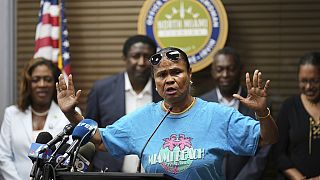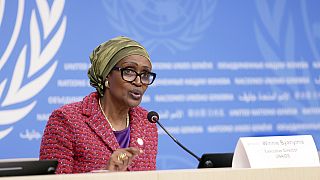South Africa
The Muslim community in Lenasia, south of Johannesburg, has been celebrating Eid-ul-Fitr to mark the end of Ramadan.
But with South Africa battered by record blackouts over the past year, some of the preparations have been especially challenging.
The state-owned power company Eskom has imposed load-shedding to manage the problem but life has still been difficult.
Faheem Essop is a paramedic who has been helping to organise the celebrations.
He said: "Ramadan was significantly impacted with the load shedding, simply because in the morning when we wake up for Suhoor, which is the early breakfast we eat before the opening of the fast, most of the time we had load shedding, so it was a bit of a struggle, a bit of a rush."
Eskom, which provides the bulk of South Arica's electricity, can guarantee supplies of 27,000 megawatts but summer demand peaked at 32,000 MW and in winter it can soar to 37,000 MW; raising the prospect of extreme cold for millions of people.
The energy situation is so dire that experts warn the country could be on the brink of a widespread collapse of its electricity grid; making it tough for Muslims trying to feed people most in need.
Sherraz Mahomed Hoosen is a policeman and volunteers in the makeshift kitchens.
"We are preparing 25 deghs [pots] of akhni for the needy, which we have been feeding for the past 15 years on Eid day," he explains.
"We give the needy the Eid lunch so they have a proper meal for Eid, some of them don't even know where the next meal is coming from."
Under pressure to end the power cuts, President Cyril Ramaphosa declared in February a National State of Disaster, a legal move introduced to prioritise efforts to address the problem.
He also appointed an electricity minister, Kgosientsho Ramokgopa, with the sole task of ending the blackouts.
But Ramokgopa, a civil engineer and former mayor of Pretoria, has run into a series of obstacles, analysts say.
Not least, the state of disaster was revoked after about two months, even though electricity supply has yet to improve.
Power supplies have now plummeted to levels even below the output officially laid out by the government.
Somayya Mia is a housewife who has been trying manage the load-shedding schedule.
"Load shedding, it was terrible," she says
"We normally have samosas for breaking fast, but we couldn't put them in the freezer, so we had to make them regularly every day because the freezer gets defrosted and samosas get thrown away.
"My freezer gave up hope, lot of stress, lot of stress."
But the outages have impacted on more than religious celebrations.
They are continuing to hold back South Africa's economic activity, with economists warning that growth could contract significantly, possibly plunging the country into recession.
The International Monetary Fund projects that real GDP growth will drop to just 0.1 percent for 2023, mainly impacted by the power cuts, from two percent last year.












01:52
In Goma, solar power brings light and hope in Ndosho neighbourhood
Go to video
African gut study reveals urbanization threatens microbial diversity
01:54
South Africa's independent mechanics join forces to compete with big companies
01:48
South Africa launches vaccination drive to combat foot-and-mouth disease outbreak
Go to video
World Bank grants South Africa $1.5B for infrastructure, green energy